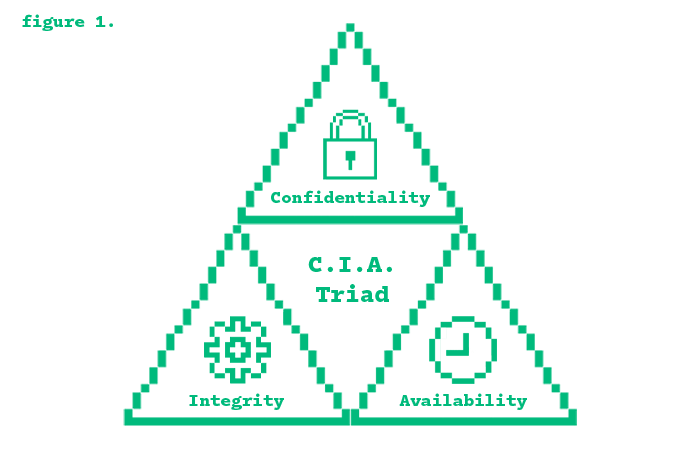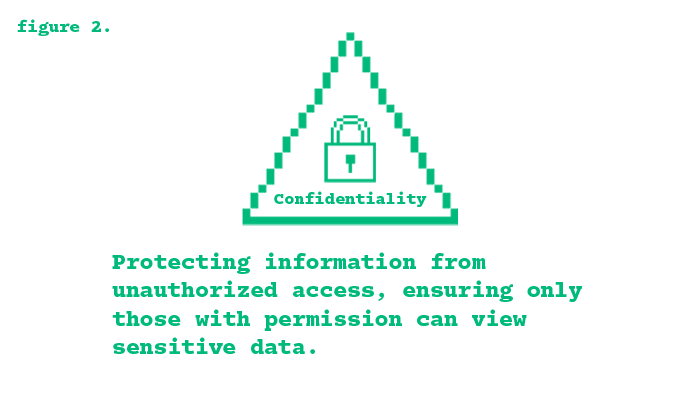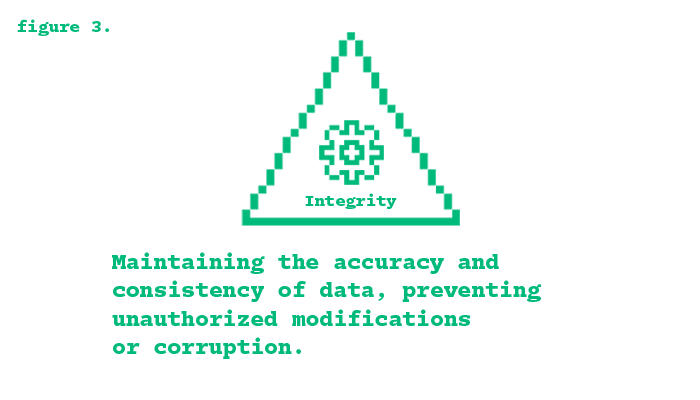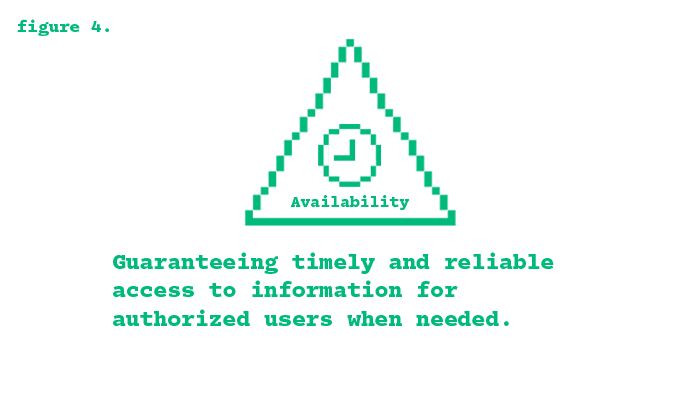
CIA Triad (Confidentiality, Integrity, Availability) is a key principle for data reliability and security for organizations. Confidentiality ensures sensitive information is only accessible to authorized individuals, protecting privacy and disallowing unauthorized access. Integrity ensures information is valid, whole, and not modified by unauthorized users, preserving its integrity. Availability ensures data and assets are accessible when and where they are needed, even in the event of downtime or cyber-attacks. Organizations use various security controls, including encryption, safe backups, and continuous monitoring, to protect these elements. By applying the CIA Triad, institutions can maintain data security, minimize threats, and grant continuous access to necessary information.
This entry isn't going to be super long. The CIA Triad is pretty straight forward and easy to understand. There are three fundamental principles in information security you should know: Confidentiality, Integrity, and Availability, collectively referred to as the ‘CIA Triad’. It serves as a guiding model for organizations to ensure their data is protected by limiting access to authorized users (confidentiality), maintaining its accuracy and consistency (integrity), and making it readily available when needed (availability). Knowing and understanding the CIA Triad is important because it is a core concept in cybersecurity, which can appear in certification exams, technical interviews, and real-world situations.

Think of the CIA Triad like a bank vault protecting valuable assets. Confidentiality ensures that only authorized individuals, like verified customers and bank employees, can access specific safety deposit boxes, blocking unauthorized access with security measures like locked doors and keycards. Integrity guarantees that the money and documents inside remain unchanged, using transaction logs and surveillance to prevent fraud. Availability ensures that when customers need their assets, they are accessible and can be maintained, avoiding downtime with backup power, redundant records, and emergency programs. Just as a bank holds the safety of financial assets, cybersecurity experts protect digital data using the foundation of the CIA Triad.
The CIA Triad can also be applied to Universities and their students. Take the University of New Haven for example. It utilizes the CIA Triad to secure student and faculty information. Confidentiality is supported by password-protected stduent portals (MyCharger), multi-factor authentication (MFA), and encrypted databases. Integrity is provided by frequent system audits and backups of data. Availability is upheld by servers, DDoS protection, and IT support services, ensuring students can access online courses, email, and university resources.
Who are you? Are you allowed to do this? What are you trying to access?
Confidentiality, which is roughly equivalent to privacy, involves not making unauthorized disclosures of sensitive information. Information is often classified based on the degree of damage that would result from its exposure so that organizations can apply the appropriate level of security controls.

For confidentiality, organizations typically provide additional training to the staff handling sensitive data. This includes risk factor identification, good password hygiene, and awareness of social engineering attacks that cyber attackers utilize to exploit human weaknesses. Various technical safeguards assist with confidentiality. Data encryption protects information both in transit and in storage, and user authentication processes—such as passwords, security tokens, biometric scanning, and two-factor authentication (2FA)—offer extra security. Online banking, for example, requires an account or routing number, and social media sites require user IDs and passwords to restrict access. For extremely sensitive data, even more drastic measures may be necessary, such as storing information on air-gapped systems, offline storage devices, or holding only hard-copy records. By implementing these measures, organizations can render unauthorized access more challenging and reduce the risk of data breaches.1
WashU St. Louis University systems are an example of how an educational institution applies the CIA Triad to protect data. Confidentiality is maintained through WUSTLKey and WashU 2FA, ensuring that only authorized students, faculty, and staff can access university systems. Researchers further protect their work by encrypting files, using password-protected resources, and restricting access to trained team members. These measures help safeguard sensitive information, ensuring privacy and reducing the risk of cyber threats like ransomware attacks. 2
The second element of the CIA Triad is integrity, which makes sure that data never changes from its initial accuracy and consistency, without being modified by legitimate users. When data is faulty or manipulated, organizations may end up with the wrong users receiving sensitive information or failing to receive critical updates. For example, in the medical field, patient data must be accurate so that medical updates reach the appropriate people. If a hospital updates another patient's record inaccurately or makes a diagnosis in the wrong place, it can cause privacy violations or even medical mistakes. Just like business records, software, games, they all rely on data integrity. Integrity in cybersecurity is like maintaining fair gameplay in a video game. Imagine you're playing an online multiplayer game where scores, player stats, and in-game currency must be accurate and protected. If a hacker modifies the game’s code to give themselves unlimited health or currency, it disrupts the game’s balance and fairness, just like how data corruption or unauthorized changes can compromise an organization’s integrity. To prevent this, game developers implement anti-cheat systems, encrypted leaderboards, and secure cloud saves to ensure that data remains unaltered and legitimate.3

WashU St. Louis University systems are an example of how an educational institution applies the CIA Triad to protect data. Confidentiality is maintained through WUSTLKey and WashU 2FA, ensuring that only authorized students, faculty, and staff can access university systems. Researchers further protect their work by encrypting files, using password-protected resources, and restricting access to trained team members. These measures help safeguard sensitive information, ensuring privacy and reducing the risk of cyber threats like ransomware attacks.4
The last element of the CIA Triad is availability, which makes sure that data is always accessible to authorized users. Making sure resources and services are still accessible even in the event of a cyberattack, hardware breakdown, or natural disaster. As businesses increasingly rely on digital infrastructure, uptime and minimizing disruptions are now core parts of cybersecurity. Some of the most important measures for availability are continuity and disaster recovery plans, impact analyses, and service level agreements (SLAs) that define uptime targets. This is achieved by putting in place redundant systems, backup power sources, load balancers, and caches to prevent single points of failure. In addition, regular system testing and maintenance guarantee detection of and reaction to possible threats before they cause outages.

Normal availability threats include power outages, network breakdowns, hardware breakdowns, and cyber threats like DDoS (Distributed Denial-of-Service) attacks. When a critical server crashes or a website gets bombed with traffic as a result of an attack, users may fail to access essential services, for instance. Resilient infrastructure and preventive security controls enable organizations to limit downtime and deliver continued access to data and systems.
For example, in healthcare, hospitals employ electronic health records (EHRs) to provide care to patients. In the event of a cyberattack like a DDoS (Distributed Denial-of-Service) attack or ransomware and disconnection is caused, the physicians and nurses may not be able to access critical health information, potentially jeopardizing patients' lives. Similarly, in online shops, website down time can translate into lost sales as well as angry customers.
In order to be available, organizations make use of server redundancy, cloud storage, load balancing, and cybersecurity measures to prevent downtime and attacks. Scheduled system maintenance, security updates, and DDoS protection see to it that users can always view the information and services they need, guaranteeing reliability and trust in electronic systems.5
The University of New Haven employs the CIA Triad to protect its information assets to ensure they remain available when required. Availability guarantees such critical systems as Blackboard, student portals, email services, and research databases are accessible and usable without any disruption. Lack of availability would render the activities of a university, from the submission of assignments to accessing courseware, completely halted. For assurance of availability, the university implements cybersecurity to assist in warding off threats like ransomware attacks that attempt to deny system access until a ransom is paid. Periodic security patches, intrusion detection systems, and firewalls assist in warding off attacks as per the view of the university's IT department. Students and staff also play their part in guaranteeing availability by reporting potential phishing, not clicking on unfamiliar links, and utilizing university-approved storage services like OneDrive for saving important documents. All these steps taken by the University of New Haven ensure that important academic and research content is available and secure.
This entry wasn't super long, at least compared to the others. That's because the CIA Triad is pretty straight forward. Confidentiality, Integrity, and Availability, and that's it. the general model applied to secure information within any institution, including educational institutions like the University of New Haven. Confidentiality ensures that sensitive data is beyond the reach of unauthorized individuals, thus providing privacy for students, instructors, and research. Maintaining integrity ensures that data is accurate and avoids unauthorized changes or corruption of essential information. Lastly, availability ensures that resources and information can be used whenever there is a need, essential in ensuring the seamless operations of an online infrastructure. Businesses can prevent likely threats of attack such as cyberattacks by practicing caution like encrypting information, secure backup measures, and real-time monitoring by users. Utilizing the CIA Triad helps institutions like the University of New Haven create a solid cybersecurity strategy, where information is secure and accessible, and business continuity and trust are guaranteed.